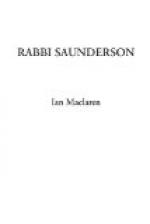Saunderson was perfectly helpless in all manner of mechanics—he could not drive a tack through anything except his own fingers, and had given up shaving at the suggestion of his elders—and yet he boasted, with truth, that he had got three times as many books into the study as his predecessor possessed in all his house. For Saunderson had shelved the walls from the floor to the ceiling, into every corner, and over the doors and above the windows, as well as below them. The wright had wished to leave the space clear above the mantelpiece.
“Ye’ll be hanging Dr. Chalmers there, or maybe John Knox, and a bit clock’ll be handy for letting ye ken the ’oors on Sabbath.”
The Rabbi admitted that he had a Knox, but was full of a scheme for hanging him over his own history, which he considered both appropriate and convenient. As regards time, it was the last thing of which that worthy man desired to be reminded—going to bed when he could no longer see for weariness, and rising as soon as he awoke, taking his food when it was brought to him, and being conducted to church by the beadle after the last straggler was safely seated. He even cast covetous eyes upon the two windows, which were absurdly large, as he considered, but compromised matters by removing the shutters and filling up the vacant space with slender works of devotion. It was one of his conceits that the rising sun smote first on an A’Kempis, for this he had often noticed as he worked of a morning.
Book-shelves had long ago failed to accommodate Rabbi’s treasures, and the floor had been bravely utilised. Islands of books, rugged and perpendicular, rose on every side; long promontories reached out from the shore, varied by bold headlands; and so broken and varied was that floor that the Rabbi was pleased to call it the Aegean Sea, where he had his Lesbos and his Samos. It is absolutely incredible, but it is all the same a simple fact, that he knew every book and its location, having a sense of the feel as well as the shape of his favourites. This was not because he had the faintest approach to orderliness, for he would take down twenty volumes and never restore them to the same place by any chance. It was a sort of motherly instinct by which he watched over them all, and even loved prodigals who wandered over all the study and then set off on adventurous journeys into distant rooms. The restoration of an emigrant to his lawful home was celebrated by a feast, in which, by a confusion of circumstances, the book played the part of the fatted calf, being read afresh from beginning to end. During his earlier and more agile years the Rabbi used to reach the higher levels of his study by wonderful gymnastic feats, but after two falls—one with three Ante-Nicene fathers in close pursuit—he determined to call in assistance. This he did after an impressive fashion. When he attended the roup at Pitfoodles—a day of historical prices—and purchased in open competition, at three times its value, a small stack ladder, Kilbogie was convulsed, and Mains had to offer explanations.




